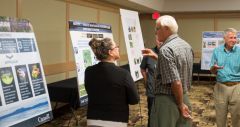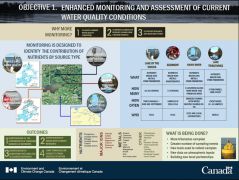 ECCC science staff interacting with members of the public (source: ECCC)On August 14th, 2017 Environment and Climate change Canada (ECCC) scientists and staff hosted a day-long public information session in Kenora. The event showcased the science underway to better understand the issue of toxic and nuisance algae in the Lake of the Woods and what actions are needed to ensure a healthy lake now and into the future.
ECCC science staff interacting with members of the public (source: ECCC)On August 14th, 2017 Environment and Climate change Canada (ECCC) scientists and staff hosted a day-long public information session in Kenora. The event showcased the science underway to better understand the issue of toxic and nuisance algae in the Lake of the Woods and what actions are needed to ensure a healthy lake now and into the future.
A series of posters displays were presented, summarizing the research project underway: pdf ECCC Science Info Session Posters - August 4, 2017 Kenora(7.85 MB)
ECCC’s program for the Lake of the Woods is increasing the amount of information collected in the Canadian portion of the Lake. This is needed to determine how much of the nutrients entering Lake of the Woods are coming from Canadian sources, which sources are contributing the most nutrients, and how much of a reduction in nutrients would be necessary to have a positive impact on the occurrence of algae. ECCC’s approach is to use a combination of research, monitoring and modelling to in collaboration with other agencies, organizations and researchers in Canada and the United States.
 Poster display presenting overview of Environment and Climate Change Canada's program for Lake of the Woods (source: ECCC)The information session provided an opportunity for concerned citizens to ask questions and to provide local knowledge and advice to those leading ECCC’s science and policy programs. Also included in the event was information from partner agencies such as the Minnesota Pollution Control Agency and the Ontario Ministry of the Environment and Climate Change.
Poster display presenting overview of Environment and Climate Change Canada's program for Lake of the Woods (source: ECCC)The information session provided an opportunity for concerned citizens to ask questions and to provide local knowledge and advice to those leading ECCC’s science and policy programs. Also included in the event was information from partner agencies such as the Minnesota Pollution Control Agency and the Ontario Ministry of the Environment and Climate Change.
Minnesota is nearing completion of its multi-year research on Lake of the Woods and is expected to release next spring, reduction targets for Minnesota sources of phosphorus – the primary nutrient that stimulates algae blooms. Ontario’s program is focused on monitoring several of the larger rivers and streams flowing into the lake to develop estimates of the amount of phosphorus from these sources.
We appreciate ECCC’s efforts in putting together the session and more importantly to everyone who came out to learn more about the work that is happening right off our docks. It was a good first start and we look forward to ECCC continuing to reach out to engage the public and other agencies in Canada and the USA in their work on the lake. We will work with ECCC to hold more events in the future to keep everyone informed and also to ensure that there are opportunities for the pubic to provide input as the research progresses. We will be developing a series of short articles in the coming months to highlight the different components of the research.
In the meantime, if you would like to read the posters displayed at the event, you can access them on the Foundation's website at: pdf ECCC Science Info Session Posters - August 14, 2017 Kenora(7.85 MB)
If you have any questions or comments for ECCC, you can contact them at
